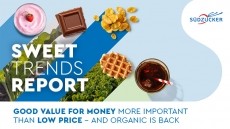Obesity plan 'dismantling' leaves bare bones of a strategy

The draft offered health campaigners a tantalising glimpse of what might have been. The big pledge was a target to cut childhood obesity by half within a decade (in real terms that would mean 800,000 fewer obese children by 2026). But how?
Well, retailers would have to rethink the balance of their promotional strategies on unhealthy versus healthy foods; they’d be challenged to “end the promotion of unhealthy foods” – no mean feat given that recent research showed 53% of 77,165 products on promotion were of the less healthy variety.
Tougher restrictions on advertising would also be brought in, via “… measures to further reduce families’ exposure to adverts for unhealthy food… This will mean that fewer of the shows watched by many of our children – including for example some popular Saturday night entertainment – will contain adverts for unhealthy food.”
‘the Responsibility Deal take two’

But all these ideas – in line with many proposals put forward by the government’s health advisors, consumer health groups and, in some cases, the retailers and devolved governments – appear to have been “dismantled” by Cameron’s successor, Theresa May, according to Dispatches’ investigation.
Indeed, the final plan, published 36 days after she defaulted into Downing Street, is a third of the size and light on regulation. Many have dubbed it ‘the Responsibility Deal take two’, given the onus is on voluntary action.
Some in the industry have also had their fingers burnt by the failed Responsibility Deal. Retailers have suggested they got fed up pulling their weight whilst others sat back. “We reformulated faster in pizzas for example than some of the leading manufacturers,” the British Retail Consortium’s (BRC) senior external affairs advisor Fintan Hastings told FoodNavigator. “That’s not fair; you can see a commercial disadvantage there.”
The BRC stated publicly that it wanted mandatory targets to help level the playing field. It didn’t get them. “Ultimately, it’s up to the government to prove the plan works,” Hastings added.
In a statement the Department of Health (DH) said: “Our plan to tackle child obesity is ground-breaking: no other developed country has done anything as ambitious.”
Few would agree that’s what has been served up. The fact the DH didn’t offer up a minister for an interview with Dispatches suggests it’s not quite sure about the plan either. Let’s not forget, the health secretary Jeremy Hunt – a man who kept his job in the post-referendum cabinet reshuffle – had promised a 'gamechanging' strategy.
It’s unclear whether Theresa May ripped her predecessors plans up, but watching the 30-minute programme, the impression you get is that the food industry had bent her ear. It was left to a former Olympic rower turned obesity campaigner to plant the seed in viewers’ minds.
“The lobbyists are all on one side of the equation,” said James Cracknell. “They’ll be the food producers and the food retailers, supermarkets. Whereas the other side, the healthy side, it’s not monetised in the same way. So I think the pressure all comes from one way and you can only have your finger in the dam for so long.”
20% sugar cut 'ambitious'

Food manufacturers, in a notable split from retailers, have made no bones about the fact that they were after a voluntary led approach. The Food and Drink Federation has said its members are happy to keep reformulating, but they aren’t so keen on targets.
The one involving a 20% reduction in sugar consumption by 2020 – one of the few commitments May kept from the June draft – is “extremely ambitious”, a spokesman said.
There are also plans to extend the advertising restrictions for unhealthy food to non-broadcast media, he added. “This voluntary move has been well-received by government and health stakeholders.”
However, the FDF confirmed that it “did not have meetings to discuss obesity with officials (or Ministers) during the period between Theresa May becoming PM and the publication of the Childhood Obesity Plan”. In fact, the FDF wasn’t even approached by Dispatches for an interview or to offer its side of the story.

We will never know whether the June draft would have been better than the final product published in August. However, at this point in time, it’s hard to argue that the strategy in place has done little more than confuse and annoy everyone.




























